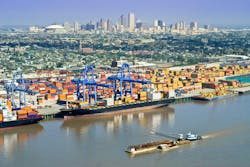US Dockworkers Launch Strike After Labor Contract Expires
Dockworkers at major ports along the U.S. East and Gulf Coasts went on strike Tuesday after last-minute negotiations yielded no new labor contract, a stoppage expected to drag on the world's largest economy.
The International Longshoremen's Association (ILA) said the walkout by its workers marks the first "coast wide strike in almost 50 years".
"We are prepared to fight as long as necessary, to stay out on strike for whatever period of time it takes, to get the wages and protections against automation our ILA members deserve," Harold Daggett, who heads the 85,000-member union, said in a statement.
The ILA said it had "shut down all ports from Maine to Texas at 12:01 am on Tuesday" after it rejected a final proposal from the United States Maritime Alliance (USMX) shipping group.
"USMX brought on this strike when they decided to hold firm to foreign-owned Ocean Carriers earning billion-dollar profits" without compensating "workers who perform the labor that brings them their wealth," Daggett said.
USMX did not respond to a request for comment.
ILA members began walking the picket lines at 14 major ports on the East and Gulf coasts soon after the announcement.
In Boston, dockworkers marched to the port carrying signs that read "no work without a fair contract," videos shared on social media showed.
CNN broadcast similar images from Philadelphia, while a New York Times video showed Daggett addressing workers on the picket lines.
"We are making history," he said in New Jersey, as dockworkers held signs saying, "Profit over people is unacceptable."
A possible stoppage had been telegraphed for months, with the odds rising in recent weeks as the two sides described themselves as far apart.
Port Strike Coverage
IndustryWeek parent company Endeavor Business Media has several publications dealing with the impact on the dockworker strike. For more coverage of the work stoppage:
- Reactions, Economic Analysis of Port Strike, Material Handling & Logistics Senior Editor Adrienne Selko offers fresh commentary from supply chain experts.
- East Coast Port Strike Halts 90% of U.S. Chemical Shipments, Chemical Processing Editor-in-Chief Traci Purdum highlights the outsized impact that the strike could have on chemical producers and many raw materials that come through East Coast and Gulf Coast ports.
- U.S. Dockworkers Strike; Auto Care Association Calls for Federal Action, Ratchet+Wrench reports on how the strike will impact U.S. automotive aftermarket businesses.
USMX said on Monday it was "hopeful" after the two sides exchanged counteroffers. However, there was still no deal when the six-year contract expired at midnight.
The walkout marks the ILA's first since 1977 and follows other high-profile strikes at U.S. automakers, Boeing and other employers.
The contract directly affects about 25,000 ILA members at 14 large U.S. ports, including New York/New Jersey, Boston, Philadelphia, Savannah, New Orleans and Houston.
“Some shippers estimate that for every one week of an ILA strike, it will take 4-6 weeks to fully recover and could cost the economy up to $5 billion per day,” according to supply chain visibility platform project44. Because we are in the midst of the ocean peak season, project44 expects an immediate impact, reporting over 100 vessels are estimated to arrive at the ports this week.
The union is pressing for protections against automation-related job loss and for hefty wage hikes after dockworkers kept providing essential services throughout the Covid-19 pandemic.
USMX said Monday its latest offer would "increase wages by nearly 50 percent, triple employer contributions to employee retirement plans, strengthen our health care options, and retain the current language around automation and semi-automation."
Media reports say the ILA is asking for a 77% wage increase over six years.
President Joe Biden, a close ally of organized labor, has so far ruled out federal intervention, citing the need to respect collective bargaining rights.
Supply Chain
The shutdown is widely expected to have a massive and immediate impact on the supply chain.
“Unlike the major strike in the 1970s, the world has changed—our reliance on the global economy and supply chains is far greater now. Manufacturing processes, price points and consumer conditioning have evolved,” says Pawan Joshi, EVP of products and strategy at supply chain platform e2open.
"The strike threatens to compound an already stressed system. Ports on the U.S. East and Gulf Coasts are the critical gateways for essential goods," says Brandon Daniels, CEO of AI supply chain management company Exiger. "We’re looking at a supply chain logjam."
“All industries will be impacted by the strike, but some of the most impacted will include energy, petrochemicals, agriculture, manufacturing and machinery, automotive, retail and consumer goods, pharmaceuticals, chemicals, food and beverage and construction materials,” according to project44.
The platform also reports the Gulf Coasts handle about 25-30% of U.S. exports of heavy equipment and industrial machinery, and East Coast ports handle approximately 30-35% of U.S. automotive imports.
“As a lot of focus this year has been on increasing reshoring efforts to bolster U.S. manufacturing, the inability to import raw materials could pose a serious blow to U.S. manufacturers," says Adhish Luitel, principal analyst at tech intelligence firm ABI Research.
John Lash, e2open group vice president of product strategy, says, “It’s not just about the value of the delayed imports and exports; it's about the critical role these components play in manufacturing. For instance, a $10 part is essential for a $50,000 vehicle. Not having these parts can significantly impact production. This creates an amplification effect within the manufacturing chain, as opposed to merely affecting consumer distribution where products go straight onto shelves."
project44 predicts an increase demand for rail and truckload transportation if shippers divert freight to the West Coast, potentially causing higher transit times and congestion. The platform says shippers could also opt for air freight, but this mode is costly and has lower capacity levels.
“Air shipping is 5-10 times more expensive and has a much larger carbon footprint,” says Joshi.
Brian Pacula, supply chain and ocean freight expert at digital services firm West Monroe, says, “Consumers can certainly expect higher prices in the near term and will face emptier shelves down the line.” He says there may also be additional consumer hesitation to spend due to inflation.
“In these scenarios, there are always winners and losers. Suppliers and manufacturers are likely to be the losers, while carriers could benefit due to increased prices,” says Lash.
Despite the bleak outlook, some experts have hope that the U.S. can avoid a major blow to the supply chain and economy.
"Some companies have diversified their ports as a lessons-learned from COVID and should be fairly nimble in switching to alternative ports. Also, the strike has been looming for many months now, giving supply chains the opportunity to prepare," says Fred Hensel, KPMG industrial manufacturing supply chain leader.
“This situation is unlikely to persist for long, given the urgency to find a resolution; for instance, the Canadian rail strike was resolved quickly due to the significant stakes involved,” says Lash.
All rights reserved ©2024 Agence France-Presse.
Additional Port Strike Coverage
- Dockworker Strike Could Impact Supply Chains, Supply Chain Connect looks into the potential impact of the strike in a story posted before dockworkers walked out.
- Auto Care Association Urges Biden Administration to Act on National Port Strike, FenderBender reports on the call for the current administration to mediate the labor negotiations.
- Supply Chain Experts Weigh in on Potential International Longshoreman’s Association Strike, Healthcare Purchasing News Editor-in-Chief Janette Wider looks into how medical and pharmaceutical industries are dealing with the work stoppage.
- Tire Imports Could Be Impacted by Strike, Modern Tire Dealer editor Mike Manges looks into how the strike could impact the tire industry.
About the Author
Agence France-Presse
Copyright Agence France-Presse, 2002-2025. AFP text, photos, graphics and logos shall not be reproduced, published, broadcast, rewritten for broadcast or publication or redistributed directly or indirectly in any medium. AFP shall not be held liable for any delays, inaccuracies, errors or omissions in any AFP content, or for any actions taken in consequence.
Anna Smith
News Editor
News Editor
LinkedIn: https://www.linkedin.com/in/anna-m-smith/
Bio: Anna Smith joined IndustryWeek in 2021. She handles IW’s daily newsletters and breaking news of interest to the manufacturing industry. Anna was previously an editorial assistant at New Equipment Digest, Material Handling & Logistics and other publications.

